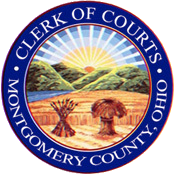
Montgomery County Municipal Court
William C. Cox, Presiding and Administrative Judge
Mike Foley, Clerk of Courts
About Ohio's Courts
What courts have jurisdiction in Ohio?
All states, including Ohio, have two systems of courts: state courts and United States courts.
State Courts?
The state courts of Ohio are on three levels: trial courts, courts of appeals and the Supreme Court. There is also a statutorily-created court known as the court of claims.
Trial courts consist of municipal, county, mayor, and common pleas courts that may include separate divisions for domestic relations, probate and juvenile cases. The court of appeals and the Supreme Court of Ohio hear appeals from the trial courts.
The court of claims hears civil cases filed against the state of Ohio, and also hears claims made for compensation by victims of crimes.
All judges within Ohio are elected for six-year terms of office. Vacancies created by death, resignation, or retirement prior to the expiration of the term are filled by appointment by the governor until an election can be held.
What do municipal and county courts do?
Municipal and county courts have limited jurisdiction and can only hear civil cases that fall within that court's territorial area, and only if the claim does not exceed $15,000. (Note: "Jurisdiction" may refer either to the geographical area or to the type of case over which a court has authority.) In criminal cases, these courts are limited to hearing only misdemeanor offenses. The municipal and county courts are created by state statute. Some municipal courts have geographical jurisdiction only within their corporate limits whereas others may have county-wide jurisdiction. In those counties where a municipal court does not have county-wide jurisdiction there are county courts.
All municipal and county courts also have what is known as a "small claims court," which is presided over by a magistrate. These courts have limited monetary jurisdiction (claims must not exceed $6,000) and are established for the purpose of enabling people to represent themselves when the amount in question is not large and the cost of litigation would be more than the value of the claim. For information about the division of municipal and county courts known as small claims court, contact the Ohio State Bar Foundation at (800) 282-6556 or (614) 487-2050.
What is mayor's court?
Communities not served by a municipal court have a mayor's court where the mayor acts as a judge. Most of a mayor's duties as judge consist of hearing traffic offenses and other violations of municipal ordinances. The mayor is not required to be a licensed attorney, but must complete special legal courses prescribed by the Supreme Court of Ohio. A mayor may appoint a magistrate to hear cases that come before the mayor's court, but the appointed magistrate must be a licensed attorney who has been practicing law for at least three years. A person charged with an offense that may result in a jail term is entitled to a jury trial in a municipal or county court, unless he or she gives up the right to a jury trial. Appeals from a mayor's court are taken to a municipal or county court, where the case will be heard as if no original trial had taken place in the mayor's court.
What are common pleas courts?
Every county has a common pleas court consisting of one or more judges. A common pleas court hears cases involving such matters as real estate, personal injury, breach of contract, marital conflicts and business relationships. This is also the court that hears all criminal felony cases, since municipal and county courts are limited to misdemeanor offenses. The common pleas court also has authority to hear administrative appeals from municipal and county agencies. The geographical boundaries of municipal, county and mayors' courts are regulated by statute, but the common pleas court has countywide jurisdiction. Because this jurisdiction is established by the Ohio Constitution, its boundaries cannot be changed without a constitutional amendment.
Some common pleas courts have a domestic relations division with one or more judges assigned to hear only marital disputes that consist of actions for divorce, dissolution, annulment, legal separation and child custody, as well as support for spouses and children. A juvenile court also may be a division of the common pleas court, or of that court's probate division or domestic relations division.
What is probate court?
Each county has a probate court as part of the common pleas court. The probate court is generally charged with overseeing the administration of estates upon the death of an individual who dies a resident of the state. Probate courts also issue marriage licenses and have jurisdiction over adoptions, name changes and competency hearings. Along with county and municipal court judges, a probate judge may perform marriages.
What is a domestic relations court?
The domestic relations court, which may be a separate division of the common pleas court, has jurisdiction over all proceedings involving termination of marriages, annulment, legal separation, spousal support, allocation of parental rights and responsibilities (including visitation), and authority over the care and support of children of divorced parents.
What happens in juvenile court?
The juvenile court has exclusive jurisdiction to hear cases involving juveniles alleged to be delinquent, unruly, abused, neglected or dependent. This court also determines issues of paternity, custody, and child support in cases involving children who have been born out of wedlock, or if no action for divorce, dissolution, annulment or legal separation has been filed in the common pleas court domestic relations division.
What is the court of appeals?
The court of appeals hears all appeals from decisions of all Ohio's trial courts except mayors' courts as explained above. The court of appeals also has "original jurisdiction" to hear certain special proceedings, which means such proceedings are filed directly in the appeals court rather than a trial court. Ohio is divided into 12 appellate districts, with each district having not less than three judges. An appellate hearing is generally based solely on written briefs and oral arguments of attorneys, and usually does not involve testimony or witnesses. After hearing arguments with respect to the trial court decision, the court of appeals may either affirm the trial court, modify the trial court decision, reverse the trial court, or remand the case to the trial court for further proceedings. Decisions of the court of appeals are based upon whether or not prejudicial errors were made at the trial court level.
What is the role of the Supreme Court of Ohio?
The Supreme Court of Ohio is the highest state court and is made up of seven elected justices, one of whom is the chief justice. The Supreme Court of Ohio has some discretion to decide which cases it will take on appeal and which ones it will not hear.
The Supreme Court of Ohio decides all state constitutional questions and those cases involving questions of public or general interest. It also hears appeals from the Board of Tax Appeals and the Public Utilities Commission of Ohio (PUCO). The Supreme Court of Ohio must hear all appeals involving criminal cases where a death penalty has been imposed.
Under the Modern Courts Amendment to the Ohio Constitution, the Supreme Court of Ohio makes rules about the operation of the courts and the practice of law in Ohio. Procedural rules adopted by the Supreme Court for the operation of the courts are effective unless both houses of the Ohio General Assembly adopt resolutions indicating their disapproval.
The Supreme Court of Ohio also has authority over admission of attorneys to the practice of law as well as discipline of attorneys and judges who violate rules governing the practice of law.
The United States Courts
The U. S. court system is similar to Ohio's court system. It consists of trial courts known as U.S. District Courts, appellate courts known as circuit courts of appeals and the U.S. Supreme Court. Unlike Ohio, where judges are elected, U.S. judges are appointed for life by the president and must be confirmed by the Senate.
The U.S. court system also has specialized courts such as bankruptcy court; the court of customs and patent appeals, which deals with patents, trademarks and copyright law; and the court of claims, which deals with claims against the U.S. government.
Bankruptcy court may be the most familiar to people having contact with the U.S. court system. This court determines whether a debtor can be relieved of the obligation of paying debts that are owed or if a plan should be adopted to enable the debtor to repay debts owed.
What is a district court?
The U.S. trial courts are called district courts. District courts are the trial courts for the U.S. system. Ohio is divided into two districts, northern and southern, and each district is divided into an eastern and a western division. These courts are limited to deciding only certain types of cases.
The U.S. District Courts have jurisdiction over cases arising under U.S. law, some cases including tort claims involving citizens of more than one state where the claim for monetary damages exceeds $75,000, and special types of cases such as bankruptcy and patents.
What is the function of the U.S. Court of Appeals?
The appellate courts within the U.S. court system are known as the U.S. Courts of Appeals. There are 12 circuits having regional jurisdiction. Ohio is in the 6th Circuit, along with Michigan, Kentucky and Tennessee. Appeals from the U.S. district court or bankruptcy court are heard in the U.S. Court of Appeals.
What is the role of the United States Supreme Court?
The highest court in the nation is the United States Supreme Court, consisting of nine justices, one of whom is the chief justice. This court hears appeals from the U.S. Courts of Appeals. The U.S. Supreme Court also determines whether or not federal or state laws violate the U.S. Constitution. Although there are certain cases that the U.S. Supreme Court must accept, it generally hears only those cases involving significant legal issues of national importance.
This factsheet is intended to be reproduced by lawyers and others for free distribution to the public.
It may not be reproduced commercially for sale at a profit.
Justice is Hard Work · Ohio State Bar Association
 CLERK OF COURTS WEBSITE
CLERK OF COURTS WEBSITE